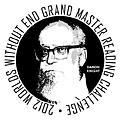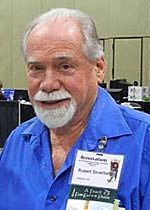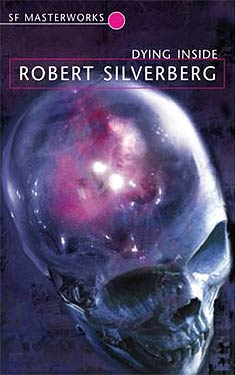GMRC Review: Dying Inside by Robert Silverberg
 Guest Blogger and WWEnd member, valashain, reviews science fiction and fantasy books on his blog Val’s Random Comments which we featured in a previous post: Five SF/F Book Blogs Worth Reading. Val has posted many great reviews to WWEnd and this is his third for the GMRC. Be sure to visit his site and let him know you found him here.
Guest Blogger and WWEnd member, valashain, reviews science fiction and fantasy books on his blog Val’s Random Comments which we featured in a previous post: Five SF/F Book Blogs Worth Reading. Val has posted many great reviews to WWEnd and this is his third for the GMRC. Be sure to visit his site and let him know you found him here.
Robert Silverberg must be one of the most prolific authors in Science Fiction. I’m not sure if there is such a thing as a complete bibliography on the web but the ones I’ve seen rival those of Isaac Asimov. Since the 1950s Silverberg has written science fiction, fantasy, soft-pornography, non-fiction, countless short stories and edited shelves of anthologies. A quick search turns up at least two dozen pseudonyms. Not all of his output is highly regarded. Especially the early works, a period during which Silverberg was basically writing as fast as he could and selling his material to pulp magazines, are considered of lesser quality. Dying Inside (1972) was written during a later period in his career, lasting from the late 1960s till his first retirement in 1975. During those years Silverberg produced some his most celebrated science fiction novels. Works in which he takes a more literary approach than earlier in his career.
David Selig is a middle aged man living in New York. When we first meet him, he is making a living selling term papers to Columbia University students, a place where he once studied himself. David is not a happy man, for the last few years he’s been feeling his talent to read people’s minds fading. It is a talent that brought him an unhappy childhood as well as immense grief and countless problems in his personal life over the years, but also one that defines him as a person. Now that it is slipping away from him, he feels he is dying inside.
For a Science Fiction novel, the story contains very few speculative elements. Selig is a powerful telepath but that is just about the only thing science fictional to it. The novel is a character study of Selig, quite introspective and entirely focused on his struggles with his talent and accepting his loss of it. The author plays with memories and flashbacks in the novel, eventually covering most of Selig’s life. Maybe this lack of action and the less plot driven character of the novel are the reason why it didn’t win any of the awards it was nominated for. It was nominated for the Nebula, Hugo and Locus awards, all three of which ended up being won by Isaac Asimov’s The Gods Themselves. I haven’t read that book, but from the description I’d say it is a bit more in line with what readers would have expected from a science fiction novel in the 1970s.
Selig is obsessed with literature, poetry, plays, classical music and philosophy and Silverberg stuffs in a lot of references to famous works of art in the story. I’ve always found it interesting that a science fiction novel is much more likely to contain such references to the classics of literature than the other way around. Silverberg included one of Selig’s papers on the works of Franz Kafka for instance. Which is not only a reference to one of his literary influences but also an example of the different styles of writing we find in the novel. The author also includes letters and has Selig talk to himself in the second person in an attempt to distance himself from some of his more shameful acts. The shifts between different phases of Selig’s life, in combination with the different styles of narrative, help keep things interesting.
At several points in the novel I wondered how much of the story is autobiographical. There are some similarities between Selig and Silverberg. Both from Brooklyn, both studied at Columbia, both with an intense interest in literature. I haven’t come across any biographies that mention Silverberg being Jewish but, given his name, it is certainly possible. A writer peering into the head of his characters (or his own head if you support the idea that all characters are some aspect of the author) is not that different from reading the mind of the people around you. Selig seem to make the link between the loss of his talent and his diminishing sexual prowess. More than one critic has pointed out the parallel between the loss of Selig’s talent and Silverberg’s loss of joy in the creative process. Something that apparently appears in different forms in other novels from this period and may have contributed to his first retirement. It sounds plausible to me but given my unfamiliarity with Silverberg’s work I have no idea how accurate it is.
Selig is a very depressing character during most of the book. His life is an unhappy one. He thinks of his talent as a curse most of the time although loosing it upsets him greatly as well. Reading the minds of others is often painful to him. Their true opinion and motives are completely clear to him and it often includes things he’d rather not hear about himself. He finds it almost impossible to start a relationship with a women when he can read her mind and the few times that he does try, it inevitably ends in disaster. One of he most telling examples of Selig’s problems with his talent is when he takes a peak in the mind of the woman he is making love to and finds she can spare not a single thought about him when she is about to climax. Not entirely unexpected perhaps, but it is a devastating experience nonetheless. It is the leitmotiv of his life I guess, people don’t really want to know the truth of what other people think of them and Selig shows us why. They shade the truth, hedge or outright lie in order to function socially. I do wonder if the emphasis Selig puts on the ugly things he finds in the minds of those around him isn’t a bit overdone. Do doubts, fears, distaste and anger really outweigh the positive things that must be present in a person as well? His reaction to knowing what people think may say more about Selig himself than the people he reads.
 I guess it shouldn’t come as a surprise that Selig’s talent can be used for personal gain. Selig does so himself in various, usually petty ways but not until he meets Tom Nyquist does he realize the full extend of what is possible. Nyquist is the only other character we meet that has David’s talent and he is quite unapologetic about it. He makes lots of easy money on Wallstreet with inside trading and is not adverse to using his talent to manipulate people. Selig is amazed and repulsed by his style of living, Nyquist’s life is one of luxury but Selig feels it is empty and ends up disgusted with him. Embracing his talent in that way makes Nyquist a lot more comfortable with himself than Selig is however, and to Selig, Nyquist can’t lie about that.
I guess it shouldn’t come as a surprise that Selig’s talent can be used for personal gain. Selig does so himself in various, usually petty ways but not until he meets Tom Nyquist does he realize the full extend of what is possible. Nyquist is the only other character we meet that has David’s talent and he is quite unapologetic about it. He makes lots of easy money on Wallstreet with inside trading and is not adverse to using his talent to manipulate people. Selig is amazed and repulsed by his style of living, Nyquist’s life is one of luxury but Selig feels it is empty and ends up disgusted with him. Embracing his talent in that way makes Nyquist a lot more comfortable with himself than Selig is however, and to Selig, Nyquist can’t lie about that.
Another striking thing about Selig’s view on the world is how much it revolves around sex. It motivates our actions to a much greater extend than many people would be comfortable admitting but since Selig tends to see right through others, it is very much exposed to him. Finding partners is rarely a problem for him since he knows for certain who is available and interested. Which of course takes something of the thrill of the chase away. Where sexual attraction or desires are mostly kept hidden for others, something not discussed openly or at best considered very private, it is completely exposed to Selig from a young age. It gives him a unique perspective on these matters and Silverberg is not afraid to expose his readers to it. He succeeds in showing the reader why this is as uncomfortable to Selig as it is to his surrounding.
I can see why this is a notable book among it’s contemporaries. Silverberg approaches the novel in a way you don’t see a lot in science fiction novels. It is a pretty dark and introspective book. I’m not sure everybody will appreciate the ending but I thought it was fitting. Dying Inside is a book that can make the reader uncomfortable by laying bare the innermost thoughts and feelings of the characters. It usually isn’t pretty, but like it or not, most of us will recognize a lot in what Selig is exposed to. I can see why this novel is one of the more highly regarded novels of the period. Some Science Fiction novels age badly. In some ways this is a novel of its time but certainly highly readable today. I’m going to have to read some more Silverberg.



















 Full Details
Full Details



5 Comments
I really need to read this novel sometime. From what I understand, compared to "A Time Of Changes", this is a much better and more mature attempt at exploring the "inner space", when New Age authors attempted to write literary quality. I’ve mostly enjoyed all the similar attempts from Silverberg, particularly during the period late-60s to mid-70s, including short stories and novellas. His novellas "Homefaring" and "Sailing to Byzantium" are definitive favorites of mine. Silverberg is easily as big as a "whale shark" in SF *smiley* *wink*. Thanks, Rob, for a stunning review.
*groan* The whale shark thing was quite unintentional you know 😛
Great review! It sounds like the novel has a very interesting take on telepathy. That is one supernatural ability I know I would never want, for some of the reasons you’ve gone over. It does seem like you would also overhear positive things, though. I’m woefully under-read in Silverberg (I went the Asimov route as a teenager), and I’ve been trying to figure out what Silverberg I should read next, after "The Stochastic Man". I think this one might be a good pick for me, since I enjoy character studies. I like the idea of Selig as Silverberg and the loss of telepathy as his decreasing enjoyment of the creative process, and I will keep that in mind when I read it!
I haven’t read much Asimov and only one Silverberg so you are still way ahead of me 😉 I guess I should pick up another Asimov for this reading challenge later this year.
For anyone looking to read more Silverberg, don’t neglect his short fiction. And Lord Valentine’s Castle might be his most popular novel, but I think Dying Inside is the most acclaimed. Nice review!
Sorry, the comment form is closed at this time.